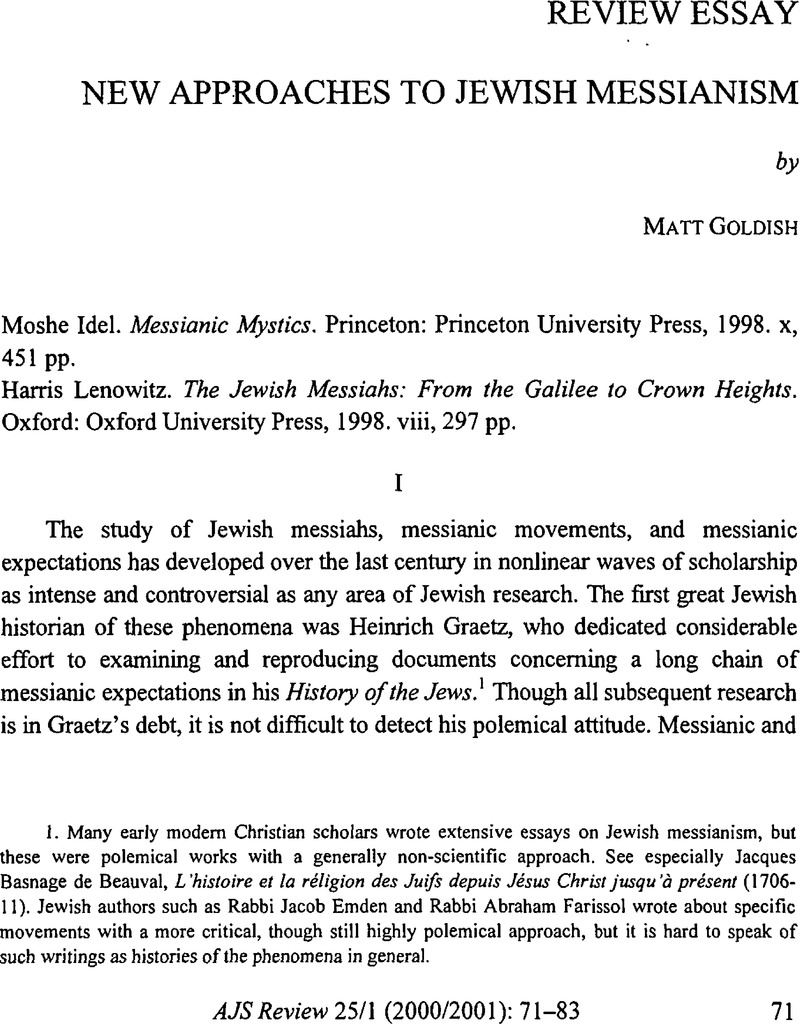Article contents
New approaches to Jewish Messianism
Published online by Cambridge University Press: 18 June 2010
Abstract

- Type
- Review Essays
- Information
- Copyright
- Copyright © Association for Jewish Studies 2001
References
1. Many early modern Christian scholars wrote extensive essays on Jewish messianism, but these were polemical works with a generally non-scientific approach. See especially Beauval, Jacques Basnage de, L'histoire et la réligion des Juifs depuis Jésus Christ jusqu'à présent (1706–1711).Google Scholar Jewish authors such as Rabbi Jacob Emden and Rabbi Abraham Farissol wrote about specific movements with a more critical, though still highly polemical approach, but it is hard to speak of such writings as histories of the phenomena in general.
2. Klausner, , “R. David Kahane: His Life and Works,” in Kahane, , Toledot ha-Mequbbalim, ha-Shabbeta'im ve-ha-ḥasidim, 2nd ed., vol. 2 (Odessa, 1914), p. x.Google Scholar
3. Klausner, , Historyah shel ha-bayyit ha-sheni (Jerusalem, 1949), vol. 5Google Scholar; quoted in translation in Encyclopaedia Judaica 10:1095. Moshe Idel has dealt with some of the surrounding issues in “Academic Studies of Kabbalah in Israel, 1923–1998: A Short Survey” (forthcoming). In private discussions Idel has pointed out how Scholem, Tishby, and other scholars of Jewish messianism in mid-century explicitly state that the mystical tradition can now be understood only in the context of the destruction of European Jewry.
4. Another recent and very important book on Jewish messianism, Schwartz's, Dovha-Ra'yon ha-meshiḥi ba-hagut ha-Yehudit bi-yeme ha-benayyim (Ramat-Gan: Bar-Ilan University Press, 1997), also makes extensive use of the method of models.Google Scholar
5. A highly useful bibliography of Idel's work has been published by Cherub Press.
6. For an earlier rendering of this thesis, see Idel's preface to the second edition of Aescoly, ha-Tenu'ot ha-meshiḥiyyot be-Yisra'el.
7. See Popkin, , “Three English Tellings of the Shabbetai Zvi Story,” Jewish History 8 (1994): 43–54CrossRefGoogle Scholar; idem, “Jewish-Christian Relations in the Sixteenth and Seventeenth Centuries: The Conception of the Messiah,” Jewish History 6 (1992): 163–177.CrossRefGoogle Scholar
8. Even Yehuda Liebes, who strongly criticized Idel for publishing Golem and other books originally in English, has allowed some of his own work to be translated.
- 1
- Cited by


